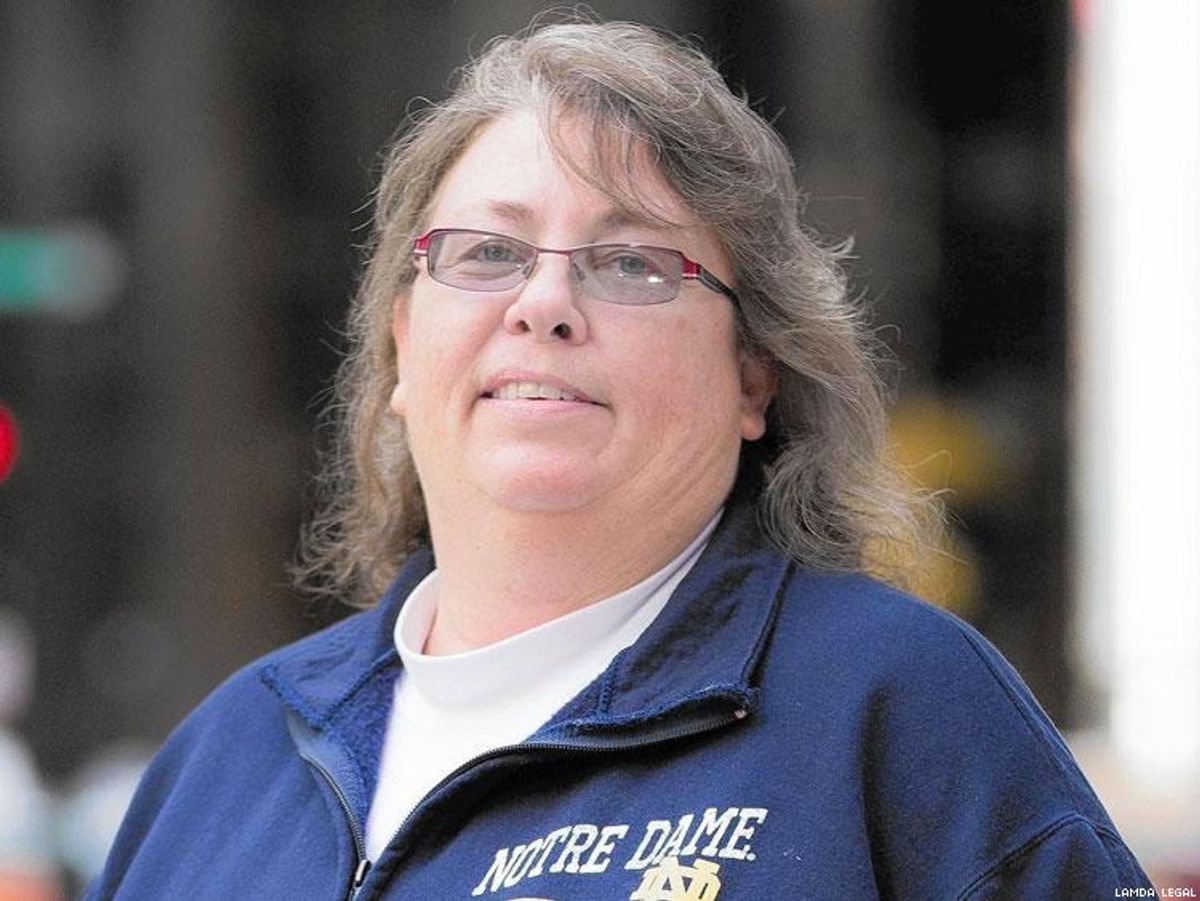The U.S. Court of Appeals for the Seventh Circuit, based in Chicago, has become the first federal appellate court to rule that Title VII of the Civil Rights Act of 1964 bans discrimination based on sexual orientation.
The decision came today in the case of Hively v. Ivy Tech Community College. Kimberly Hively (pictured) was a math instructor at the college, located in South Bend, who said she was repeatedly denied promotions and ultimately fired after it became known she was a lesbian. She had been seen kissing her girlfriend in the parking lot at the school.
Lambda Legal, representing Hively, argued that discrimination based on sexual orientation is a form of sex discrimination, which is prohibited by Title VII. It argued that the expectation that people will be heterosexual is a gender stereotype, so discrimination against nonheterosexuals is sex discrimination. Today, a majority of the 11 judges on the Seventh Circuit agreed, reversing a decision that came last year from a three-judge panel of the circuit.
"Hively represents the ultimate case of failure to conform to the female stereotype (at least as understood in a place such as modern America, which views heterosexuality as the norm and other forms of sexuality as exceptional): she is not heterosexual," Chief Judge Diane Wood wrote for the court majority in the 8-3 decision. "Our panel described the line between a gender nonconformity claim and one based on sexual orientation as gossamer-thin; we conclude that it does not exist at all. Hively's claim is no different from the claims brought by women who were rejected for jobs in traditionally male workplaces, such as fire departments, construction, and policing. The employers in those cases were policing the boundaries of what jobs or behaviors they found acceptable for a woman (or in some cases, for a man)."
Several federal trial courts and the U.S. Equal Employment Opportunity Commission have interpreted Title VII in this manner, but the Seventh Circuit, as a federal appeals court, is the highest court to make that finding and sets precedent for the three states it covers, Illinois, Indiana, and Wisconsin. It remanded Hively's case to the trial court, which had dismissed her case, for rehearing, but it is likely that at some point the issue of whether Title VII covers sexual orientation discrimination will come before the U.S. Supreme Court. Some courts and the EEOC have held that Title VII applies to discrimination based on gender identity as well.
Hively, represented by Lambda Legal, filed her lawsuit in August 2014. The trial court dismissed her case on the basis that Title VII's ban on sex discrimination did not cover discrimination based on sexual orientation. Now it will have to decide the case on the basis of whether such discrimination actually took place.
"Love won again today," said Lambda Legal CEO Rachel B. Tiven in a press release. "Kim Hively loved her job teaching math at Ivy Tech Community College, but she was fired because she is a lesbian. Today the Seventh Circuit said clearly: That's wrong. Our movement is about love and pride. Pride in yourself and your work, and the freedom to love and to be treated equally. Even in these challenging times, Lambda Legal continues to win in court and make our country better."
"I have been saying all this time that what happened to me wasn't right and was illegal. Now I will have my day in court, thanks to this decision," Hively said in the release. "No one should be fired for being lesbian, gay, or transgender like happened to me and it's incredibly powerful to know that the law now protects me and other LGBT workers."
Other LGBT groups praised the decision as well. "This decision opens the door to a new era for LGBTQ plaintiffs under federal sex discrimination law," said Shannon Minter, legal director for the National Center for Lesbian Rights. "With this historic decision, the Seventh Circuit is the first federal appellate court to acknowledge that discrimination because a person is gay, lesbian, or bisexual can only reasonably be understood as discrimination based on sex. The court deserves credit for rejecting the tortured rationales of older decisions and undertaking a principled analysis, based on the Supreme Court's affirmation in Price Waterhouse and other cases, that Title VII of the Civil Rights Act of 1964 must be broadly construed to prohibit the full range of sex-based discrimination."
One of the judges who dissented, Diane Sykes, was on Donald Trump's long list of potential Supreme Court picks. She had previously ruled in favor of a college organization's right to discriminate against LGBT people even if it receives public funds.
This story is developing. Check back for updates.


















































































Fans thirsting over Chris Colfer's sexy new muscles for Coachella